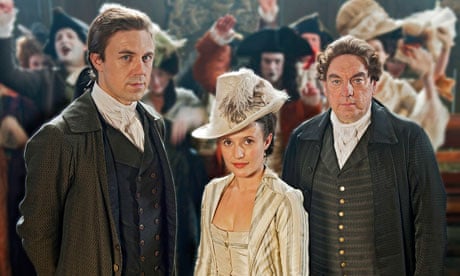Who would have wanted to be an Old Bailey barrister in Georgian London – regarded by many as an ambulance chaser, and uncomfortably close to the foul smells wafting up from Newgate gaol? Unsurprisingly, of the 484 barristers in London in 1784, only 10 practised regularly at the Old Bailey, according to the historian JM Beattie. But that didn't stop William Garrow spending a decade as the Old Bailey's top dog.
I first became involved with BBC1's Garrow's Law back in 2008, finding drama in real cases from the newly digitised Old Bailey archive. I was drawn to the late 1700s as a time of massive change: revolution in America and France, the beginnings of the end of the slave trade, the emergence of the women's movement and the reform movement. When you read the Old Bailey cases from this period, Garrow is everywhere, almost always for the defence. His personal life is intriguing too – particularly his "irregular relationship", as contemporary commentators put it, with Sarah, who'd had a child with politician and landowner Arthur Hill.
Like the first series, the new series of Garrow's Law is inspired by his life and the cases from the period. In the first episode we see Garrow take a stand against the inequality of the courtroom, which very often meant the accused had no access to a barrister at all, by offering his cross-examining services for free as "amicus curiae". The episode takes inspiration from the case of Sarah Pearson in 1790 and the case of Sarah Slade and Mary Wood in 1783 , in which Garrow cross-examines a witness, again for free, about "a remarkable key".
The transcripts of these and other real Old Bailey cases have been used as inspiration in the series. On many occasions, in fact, the actual words spoken in court are recreated. The case of Phebe Harris in episode two focuses on a woman who was sentenced to be burnt at the stake for counterfeiting money, or "coining" as it was known, which was inspired by two real cases. The first was the 1786 case of Phebe Harris , which pitted Garrow against Silvester. Sadly, Garrow lost and Phebe was sentenced to death. When she was executed, 20,000 people turned up to watch the flames. The second case was from 1790 and involved a woman called Sofia Girton who was also sentenced to death by burning. Her terror is horrifyingly evident from the transcript where she cries out: "Oh you base wretch! You cruel villain! You cruel, false-swearing creature." The show's writer, Tony Marchant, has put these words into the mouth of our Phebe.
Garrow's Law is not a biographical documentary. It's a drama that aims to give viewers a real sense of what life was like in legal London towards the end of the 18th century; to give people a chance to experience the big legal landmarks and the cases that caused a stir at the time. One such case was that of the slave ship Zong, from which 132 Africans were thrown into the sea, leading to an insurance dispute. The idea that throwing slaves overboard was regarded by the law in the same way as throwing wood, horses or any other "cargo" overboard was shocking enough to serve as a recruitment aid for the anti-slavery movement.
While this case did not involve Garrow, he would doubtless have been aware of it – and we felt we simply wouldn't be doing justice to the period if we left it out, and so in our drama it is Garrow who tackles it. I like to think that, given Garrow's personal policy of refusing to defend slavers, and the fact that, later in his life, he oversaw the first prosecution under the Abolition of the Slave Trade Act of 1807, he would have been happy with the episode.

Comments (…)
Sign in or create your Guardian account to join the discussion